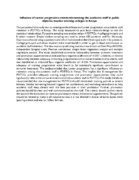| dc.description.abstract | The purpose of this study was to investigate the influence of career progression on academic staff retention in PDTTCs in Kenya. The study employed ex post facto research design to test the statistical relationships. Purposive sampling was used to select 4 PDTTCs, 4 college principals and 8 senior masters. Simple random sampling was used to select 430 academic staff for the study. Data was collected using a questionnaire which had closed-ended (likert type scale 1-5) questions. College principals and senior masters were interviewed in order to get in-depth information on academic staff retention. The data was analyzed using statistical tools such as One-Way-ANOVA, Independent Samples t-test, Pearson correlation, simple linear regression analysis and multiple regression analysis. The study established an inverse relationship between turnover intentions and promotion opportunities as indicated by a negative coefficient of-0.047. Likewise, an inverse relationship between adequacy of training programmes and turnover intentions of academic staff was established as indicated by a negative coefficient of-0.130. Promotion opportunities and adequacy of training programmes were found to be statistically significant contributors to turnover intentions. The studyconcluded that career progression has a significant influence on retention among the academic staff in PDTTCs in Kenya. This implies that if management for PDTTCs provided adequate training programmes and promotion opportunities, they could significantly reduce the turnover intentions of the academic staff in PDTTCs.The study therefore, recommended that the management for PDTTCs should revise their training policies to ensure fairness, besides increasing financial support for conferences and workshop attendance to help academic staff keep abreast with the best practices in their profession. Further, promotion policies should be clear and well communicated to the staff. The criteria should outline clearly the stand of the institution on internal promotions versus the external appointments. The policies should be revised to make it all inclusive so that it is not skewed in favour of some duties while ignoring others and also to reflect fairness. | en_US |

